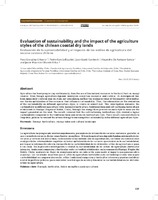Mostrar el registro sencillo del ítem
Evaluation of sustainability and the impact of the agriculture styles of the chilean coastal dry lands.
| dc.contributor.author | González-Ulibarry, Paco | |
| dc.contributor.author | García-Elizalde, Pedro | |
| dc.contributor.author | Gastó-Corderch, Juan | |
| dc.contributor.author | De Kartzow-Garcia, Alejandro | |
| dc.contributor.author | Obando-Ulloa, Javier | |
| dc.date.accessioned | 2017-05-11T22:00:33Z | |
| dc.date.available | 2017-05-11T22:00:33Z | |
| dc.date.issued | 2017 | |
| dc.identifier | https://revistas.unal.edu.co/index.php/acta_agronomica/article/view/52218/57143 | |
| dc.identifier.citation | https://revistas.unal.edu.co/index.php/acta_agronomica/article/view/52218 | es |
| dc.identifier.uri | https://hdl.handle.net/2238/7086 | |
| dc.description.abstract | La agricultura ha progresado ininterrumpidamente, pasando de la utilización de recursos naturales gratuitos al uso creciente de recursos fósiles como fuentes energéticas. Si bien la agricultura depende fundamentalmente de los recursos y servicios del ecosistema, su desarrollo se ha centrado sólo en la producción, sin tomar en cuenta el valor ecológico de las externalidades negativas ni la descapitalización de los recursos que inciden en la sustentabilidad, por lo que la información sobre la evaluación de la sustentabilidad de los diferentes estilos de agricultura es poca o casi nula. En la presente investigación se evaluó la sustentabilidad de los estilos de agricultura (horticultor intensivo, tradicional campesino y horticultor auto sostenible) establecidos en la comuna de Hualqui (Región del Biobío, Chile), mediante los flujos de energía presentes en cada estilo, para medir el impacto que generan sobre el paisaje. Los resultados muestran que el estilo de agricultura horticultor auto sostenible presenta una mayor sustentabilidad en comparación con los estilos tradicional campesino y horticultor intensivo y pueden contribuir a nivel de políticas públicas para reorientar la estrategia de acción y fomentar la sustentabilidad en los distintos estilos de agricultura. ¬¬¬¬ Agriculture has been progressing continuously, from the use of free natural resources to the fossil fuels as energy sources. Even though agriculture depends mainly on ecosystem resources and services, its development has been apparently centered only on yield, not considering neither the ecological value of the negative externalities nor the decapitalization of the resources that influence sustainability. Thus, the information on the evaluation of the sustainability on different agriculture styles is scarce or almost null. This investigation evaluates the sustainability in different agriculture styles (intensive horticulture, traditional farm and self-sustaining horticulture) established in Hualqui (Region of Biobío, Chile), through the energy flows present on each style to measure the impact generated on the land. The results revealed that the self-sustaining horticulture style showed a higher sustainability compared to the traditional farm and intensive horticulture style. These results can contribute to the public, policies to reorient the action strategy to encourage the sustainability in the different agriculture styles. | es |
| dc.language.iso | spa | es |
| dc.rights | acceso abierto | es |
| dc.source | González Ulibarry, Paco; García Elizalde, Pedro; Gastó Corderch, Juan; De Kartzow Garcia, Alejndro; Obando-Ulloa, Javier. 2017. Evaluation of sustainability and the impact of the agriculture styles of the chilean coastal dry lands. Acta Agron. (2017) 66 (1) p 109-114. | |
| dc.subject | Secano | es |
| dc.subject | Horticultura | es |
| dc.subject | Rendimiento energético | es |
| dc.subject | Paisaje botánico | es |
| dc.subject | Research Subject Categories::FORESTRY, AGRICULTURAL SCIENCES and LANDSCAPE PLANNING::Landscape planning::Nature conservation and landscape management | es |
| dc.title | Evaluation of sustainability and the impact of the agriculture styles of the chilean coastal dry lands. | es |
| dc.title.alternative | Evaluación de la sustentabilidad y el impacto de los estilos de agricultura del secano costero chileno. | es |
| dc.type | artículo original | es |
Ficheros en el ítem
Este ítem aparece en la(s) siguiente(s) colección(ones)
-
Artículos [26]


